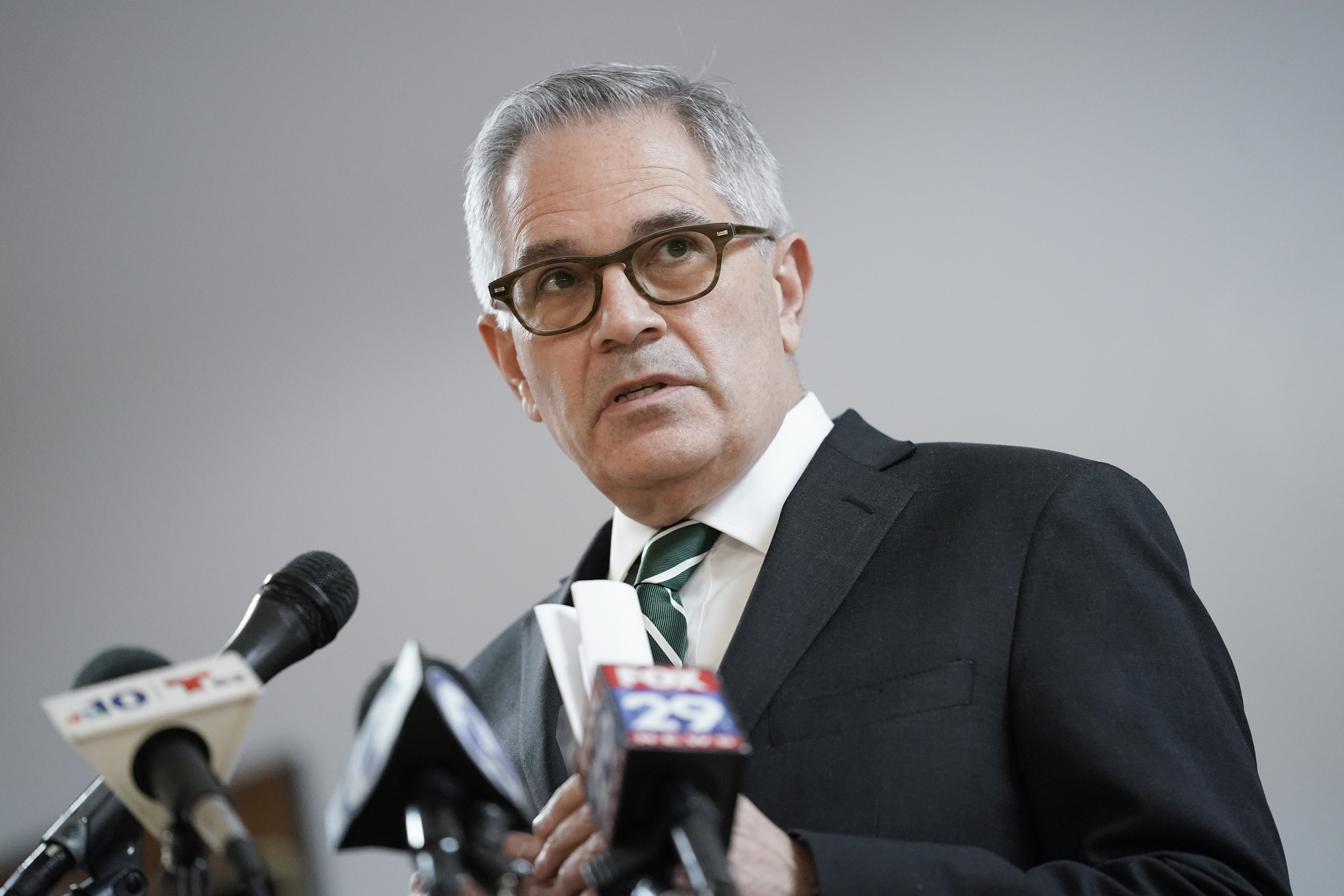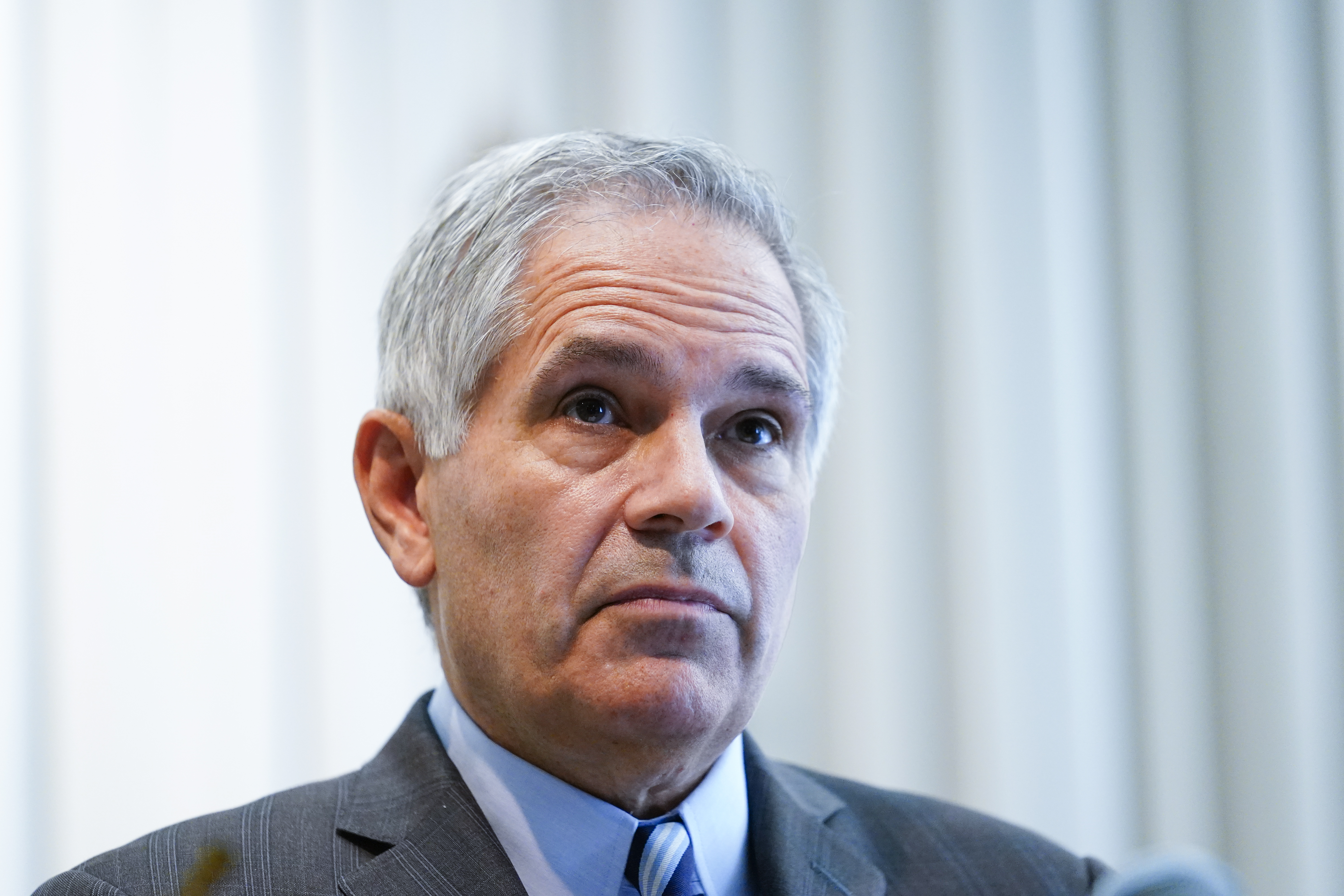What to Know
- A Pennsylvania court is turning aside a legal challenge by Philadelphia District Attorney Larry Krasner against Act 40, a law establishing a new special prosecutor to handle crimes on SEPTA property.
- A divided Commonwealth Court on Friday turned down Krasner’s argument that the law passed late last year violates the state Constitution. Krasner sued over the law in January, arguing it unconstitutionally stripped him of geographic jurisdiction and removed his core prosecutorial functions, among other grounds.
- The law directs the state attorney general to appoint the new special prosecutor, who can’t have worked for that office or Krasner’s in the past six years. The office has appointed Michael Untermeyer, Esq.
Philadelphia District Attorney Larry Krasner lost a court decision Friday in his lawsuit seeking to halt Act 40, a law that directed the appointment of a special prosecutor by the attorney general's office to handle crimes on SEPTA property.
A divided Commonwealth Court turned down Krasner's argument that the law passed late last year by Republicans in the General Assembly, along with dozens of Democratic votes, violates the state Constitution.
Get top local stories in Philly delivered to you every morning. >Sign up for NBC Philadelphia's News Headlines newsletter.
Krasner, a Democrat, sued over the law in January, arguing it unconstitutionally stripped him of geographic jurisdiction, removed his core prosecutorial functions and other grounds.
The law gives the special prosecutor the ability to take over crimes “within” SEPTA and when that occurs, requires the district attorney to suspend investigations and proceedings and turn over the files to the special prosecutor.
It was passed amid concerns by some about crime in Philadelphia and their belief that Krasner's progressive policies have made the situation worse. Krasner argues he's prosecuted the vast majority of crimes that come to his office from SEPTA. Democratic Gov. Josh Shapiro signed the law and has referred to it as "concurrent jurisdiction" that would provide law enforcement officials with additional tools to prevent crime in the city.
Act 40
In a dissent, Judge Christine Fizzano Cannon said the law improperly delegates the General Assembly's legislative authority, allowing the special prosecutor to decide what “within” means in regard to SEPTA. She said that was too vague and a fatal defect in the law. Cannon and two other judges said they would have thrown out the law.
“SEPTA is an agency. It is an entity. It is not a specific place or a tangible thing. The meaning of ‘within’ in relation to SEPTA conveys no concrete impression to the ordinary person; it is simply incomprehensible,” Fizanno Cannon wrote.
She argued the law also violates the due process rights of criminal defendants by preventing them from challenging the special prosecutor's authority.
Attorney General Michelle Henry's office told the court last week it was about to make a firm job offer to a candidate for special prosecutor, the majority opinion noted. A message seeking comment was left for her spokesman.
The law gave the state attorney general 30 days to appoint the new special prosecutor, who can’t have worked for that office or Krasner’s in the past six years. The prosecutor’s costs would be reimbursed by the city, and the attorney general’s office would foot the bill for a per diem salary, equal to the pay of a district attorney.
The SEPTA prosecution jurisdiction bill’s primary sponsor, Sen. Wayne Langerholc, a Republican from Cambria County, has said he envisioned the special prosecutor as picking and choosing which crimes to pursue, leaving the rest to Krasner. The law is set to expire along with the end of Krasner's second term in December 2026.
Krasner also is awaiting a Supreme Court decision about whether the state Senate can proceed with a trial regarding whether to remove Krasner from office. Republicans who controlled the House last session voted to impeach Krasner, but trial in the GOP-majority Senate is on hold while the high court weighs the matter.
Krasner speaks out against court's decision
In his past criticisms of Act 40, Krasner has said that a special prosecutor would erase the votes of the more than 155,000 people who elected him as the city’s district attorney. Krasner touched on the disenfranchisement of Philadelphia residents, particularly people of color, while speaking out against the court’s decision during a press conference Friday afternoon.
“The disenfranchisement of certain people by other people is a sad part of our history and it’s one that we should not repeat,” Krasner said. “I am hopeful that our Supreme Court will see the wisdom of invalidating as unconstitutional, this law.”
Krasner also pushed back against the notion that the intention of those who support Act 40 is to reduce crime on SEPTA.
“If they cared about public safety here then they would be letting us do some things to deal with gun regulation,” Krasner said. “If they cared about public safety here they would fund our public schools. If they cared about public safety here, we wouldn’t have to beg them to fund SEPTA properly. That’s the reality of what’s going on here. This is not about public safety. Because Philadelphia is doing a remarkably good job at improving public safety and this office is apart of that. This has been about politics. It has been about a politics of fear. It has been about a racist politics. And that is what’s really going on.”
Krasner also rejected claims that overall crime in Philadelphia has increased, citing data from Philadelphia police which shows a 37 percent drop in homicides in the city so far in 2024 compared to the same time last year.
"The reality is if you look at the Philadelphia police department’s own data available every day. Updated every day. If you look at FBI data. If you check reliable national sources. We are in a phase of tremendous improvement," Krasner said. "The number of homicides today in Philadelphia is significantly below where it was the year before I came into office."
SEPTA Special Prosecutor named
Attorney General Michelle Henry announced in a statement on Friday that she had chosen the person who will be the special prosecutor on SEPTA.
Henry named Michael Untermeyer, Esq. to the role.
Untermeyer will be in charge of investigating and prosecuting crimes on the transit system, according to the Attorney General's office.
The office of the Attorney General says that it informed the Commonwealth Court that it would be making the special prosecutor appointment on Friday. With the court's ruling, the appointment of Untermeyer is allowed to go forward.
“We worked diligently to follow the mandates of Act 40 to fill the position, first by posting the opportunity, then interviewing applicants to ascertain if they fit the specific criteria established by the law,” Attorney General Henry said. “We selected a candidate who expressed a commitment to public safety while possessing the qualifications required by Act 40.”
Untermeyer was working as an attorney in a private practice, the office said. He has served as special counsel to the Office of Inspector General, Deputy and Senior Deputy Attorney General.
He has fifteen years of experience as a prosecutor, the office said.



